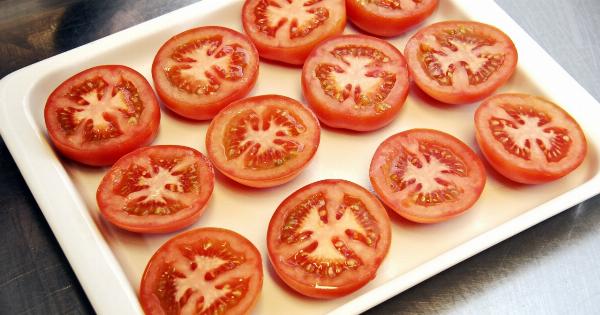Cancer is a dreaded disease that affects millions of people worldwide. While advancements in research and medical treatments have increased the chances of survival, prevention is nonetheless crucial.
One way to minimize the risk of cancer is by incorporating a variety of vegetables into our daily diet. Not only are these colorful and flavorful additions to our meals, but they also boast an array of cancer-fighting properties. In this article, we will explore how to maximize the anti-cancer potential of your vegetables.
1. Choose a Rainbow of Colors
When it comes to vegetables, diversity is key. Each color signifies a different set of phytochemicals which possess potent anti-cancer properties.
Red vegetables such as tomatoes and peppers are rich in lycopene, a powerful antioxidant known to combat various types of cancer. Green leafy vegetables like spinach and kale contain chlorophyll and folate, which assist in DNA repair and prevent abnormal cell growth.
Carrots and sweet potatoes packed with beta-carotene, fall into the orange category and are effective against lung and breast cancers.
2. Opt for Organic or Homegrown
Choosing organic vegetables or growing your own can significantly enhance their anti-cancer potential. Organic produce is cultivated without the use of synthetic pesticides, herbicides, or genetically modified organisms (GMOs).
These chemicals have been linked to an increased risk of certain cancers and can also have negative impacts on the environment. By going organic or growing your own vegetables, you ensure that you’re consuming the purest and most nutrient-dense options available.
3. Don’t Overcook Your Veggies
The way vegetables are cooked can affect their cancer-fighting properties. While it’s essential to cook certain vegetables to increase their digestibility, overcooking can lead to nutrient loss.
Many vital nutrients and enzymes are heat-sensitive and can be destroyed when exposed to high temperatures. To maximize the benefits, try steaming, stir-frying, or eating vegetables raw whenever possible. If you do choose to cook them, opt for gentle methods like lightly sautéing or blanching.
4. Add Garlic and Onions to Your Dishes
Garlic and onions are not only fantastic flavor enhancers but also excellent allies in the fight against cancer. They contain sulfur compounds that stimulate the body’s detoxification systems and help eliminate carcinogens.
These compounds also halt the formation and progression of cancer cells. Add chopped garlic and onions to your stir-fries, soups, salads, or any other dish to maximize their anti-cancer potential.
5. Do Not Peel Your Vegetables
Did you know that vegetable peels often contain a high concentration of antioxidants and other cancer-fighting compounds? Many people have a habit of peeling vegetables before cooking or eating them, but this discards essential nutrients.
Instead, give your produce a thorough wash and consume them with their skins intact whenever possible. Of course, be sure to wash them thoroughly to remove any dirt or pesticide residue.
6. Incorporate Cruciferous Vegetables
Cruciferous vegetables, such as broccoli, cauliflower, cabbage, and Brussels sprouts, are rich in glucosinolates. These compounds have potent cancer-fighting properties and aid in detoxification.
Glucosinolates are broken down into sulforaphane and indole-3-carbinol when these vegetables are chopped, chewed, or cooked. These compounds help neutralize cancer-causing substances, prevent the growth of tumors, and even induce cancer cell death.
7. Enjoy Fermented Vegetables
Fermentation is an ancient preservation method that not only adds a delicious tangy taste to vegetables but also amplifies their health benefits.
During fermentation, beneficial bacteria break down sugars and produce compounds like lactic acid, which promote gut health and aid digestion. Additionally, fermented vegetables like sauerkraut, kimchi, and pickles contain higher levels of antioxidants and anti-cancer substances compared to their fresh counterparts.
8. Combine Turmeric with Your Veggies
Turmeric is a bright yellow spice commonly used in Asian cuisine, particularly in curries. It contains a compound called curcumin, which exhibits potent anti-inflammatory and anti-cancer properties.
Combining turmeric with your vegetables not only enhances flavor but also boosts their anti-cancer potential. Add a pinch of turmeric to your stir-fries, roasted vegetables, or even sprinkle it over your salads to reap its benefits.
9. Steer Clear of Added Sugars
While naturally occurring sugars in vegetables are not a cause for concern, added sugars in processed foods can be detrimental to your health. Consumption of excessive added sugars has been linked to obesity, diabetes, and certain types of cancer.
Opt for fresh vegetables over canned ones, and read food labels carefully to avoid hidden sugars. Preparing homemade meals with whole vegetables will allow you to control the sugar content and maximize their anti-cancer potential.
10. Aim for Variety and Moderation
Although vegetables are incredibly beneficial, it’s essential to remember that moderation and variety are key to a healthy diet.
Incorporate a wide range of vegetables in your meals to benefit from their unique array of nutrients and health-promoting properties. By doing so, you can maximize the anti-cancer potential and overall health benefits of your vegetable-rich diet.
Conclusion
Adding a variety of vegetables to your diet is a simple and effective way to maximize the anti-cancer potential of your meals.
Choosing organic or homegrown vegetables, cooking them lightly, incorporating garlic and onions, and consuming them with their peels are all strategies that enhance the cancer-fighting properties. Additionally, incorporating cruciferous vegetables, fermented options, and spices like turmeric can further amplify their benefits. Remember to avoid added sugars and strive for moderation and variety.
By following these guidelines, you can create delicious and nutritious meals while reducing your risk of cancer.






























